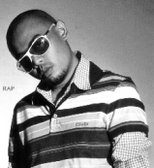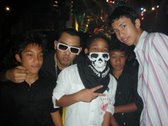Joe Flizzow's Book Review:'The Rose That Grew From The Concrete'
Review by Joe Flizzow
Last May 2007, Joe Flizzow was invited by the Star newspaper (Malaysian daily) to contribute a book review for the 'Bookshelf' section. Joe, an avid reader himself, was more than happy to do so. For his review, he chose Tupac Shakur's 'The Rose That Grew From The Concrete'. Joe's article came out on the 27th of May 2007. Read on for the full review. Enjoy!
Source: The Star
L I F E S T Y L E
Bookshelf
Sunday May 27, 2007
Glimpses into the soul of a rapper
Guest Reviewer: By JOE FLIZZOW
The Rose That Grew From The Concrete
By Tupac Amaru Shakur
Publisher: Pocket Books, 151 pages
(ISBN: 978-141-651-1656)
THE last time I wrote for a newspaper was an obituary. I was 17 years old when rap superstar Tupac Shakur died. I felt compelled to tell the world, in my small way, what we had lost and immediately sat down to pen my contribution. It was published. For an aspiring rapper, it was an honour I couldn’t describe.
His death shocked the hip hop community who had waited and prayed when news of him being wounded during a drive-by shooting was announced.
Many were sure that Tupac, ever the fighter, would be back on his feet in no time. After all, this was the Tupac who had earlier survived five gunshots in a Manhattan studio attack culminating in that famous image of him laid out on a stretcher, all bandaged and covered in blood, but showing a defiant middle finger to paparazzi.
But this time he didn’t make it. Tupac, or Pac as he was affectionately known to his close friends, succumbed to respiratory failure and cardiopulmonary arrest on Sept 13, 1996, after a seven-day coma. He was 25 years old.
I am revisiting this subject for the sole love of one of his legacies. The Rose That Grew From Concrete is a collection of poems written by a young Pac from 1989 to 1991. Arguably one of the most controversial and misunderstood artistes of our time, this book shows a side of Tupac which is often forgotten – a loving and sensitive side.
The book starts with “The Rose That Grew From Concrete” which he describes as an autobiographical poem. Just like the rose, Tupac’s life had always been a struggle and a fight right from the time his Black Panther militant mother, Afeni, carried him in her womb while in jail, to his demise. It was always him against the world from the start – from lawsuits, periods of incarceration to rape accusations.
Part one of the book shows a young and innocent side of Tupac who was often disappointed, sometimes lonely and frustrated. In “Sometimes I cry”, Tupac shares honest and intimate thoughts which are uncharacteristic of his “Thug Life” image. In “Life Through My Eyes” he talks about the violence and poverty a young black male had to go through in the ghetto and how his only way out was “unless my destiny comes through.”
Tupac knew that he was destined to go on to something big, and realised at an early age that he could make a difference; or rather he had to make a difference. “What Is It That I Search 4” asks questions of what he seeks, and whether he’ll succeed in his missions.
Another poem from part one that stands out is ‘‘If I Fail”, showing an insecure side of Pac as the title suggests. Tupac also wrote poetry dedicated to Marilyn Monroe in “The Shining Star Within” and to Vincent Van Gogh in “Starry Night”. In “God” he talked about his the deep relationship and belief he had in the Almighty, to whom he constantly turned to, to ease all the hard times and the pain he went through.
Part Two continues with “Nothing Can Come Between Us”. I do not know whether the poems were compiled according to chronological order or by themes, but this chapter shows a more responsible, confident and assuring Tupac. In the first poem, dedicated to his friend John, he invites us to revel for a moment in the camaraderie shared by best friends. He also dedicates a number of poems for presumably the women in his life at that point, showing off the smooth and charming charisma that would make him a sex icon later in his life.
In “1st impressions”, dedicated to Irene, he tells her “your eyes attracted me first, but you reeked of sultry confidence, I couldn’t wait to touch lips, and kiss with my heart’s intentions”.
But amongst all the poems dedicated to the ladies in his life, be they flings or crushes, one poem caught my attention. “Black Woman”, written for Marquita, tells of his admiration for this strong black female presence in his life and how her spirit, purity and strength were an example to him.
Tupac also wrote a number of poems for actress Jada Pinkett, with whom he had attended the Baltimore School of Arts. In the documentary Tupac: Resurrection, Tupac says, “Jada is my heart. She will be my friend for my whole life.” In return, Jada calls Pac “one of my best friends. He was like a brother. It was beyond friendship for us. The type of relationship we had, you only get that once in a lifetime.”
Poems “Jada” and “The Tears In Cupid’s Eyes” were written and dedicated to her in the book.
In part three, “Just A Breath Of Freedom”, dedicated to Nelson Mandela, shows a politically-conscious young Pac. It is written presumably just before Mandela’s release after 27 years of imprisonment and the injustice that shrouded it all.
“Can U C the pride in the panther” exclaims Pac, showing love and glorifying the movement synonymous with his black pride and afro-centric roots. He continues to do so, again addressing social issues such as crack (drugs) in “U R Ripping Us Apart!!!” and teenage pregnancy in ‘Tears of a Teenage Mother’. These were the foundations laid down for his future hit songs such as Brenda’s Got A Baby and Keep Your Head Up.
Tupac continues this journey into his soul with the fourth and last part of the book, “Liberty Needs Glasses”. He goes deeper with “Nightmares” and “The Unanswerable”, still searching for the meaning of life and his own words, the path of purity and positivity.
But the most haunting poem in the whole book would definitely have to be the final one, “In The Event Of My Demise”, in which he openly predicts his untimely death. He says, “I will die before my time, because I feel the shadow’s depth, so much I wanted to accomplish, before I reached my death.” It is evident that his fascination with the subject of death started early. He would go on to record tracks such as If I Die Tonight, Death around the Corner and Something To Die For later in his career.
I thoroughly enjoyed this book and recommend it not only to hip hop fans but also to poetry lovers. It makes a great leisurely read, one that I’ve kept coming back to ever since getting hold of it last October. Each poem is accompanied by the original as scribbled by the author himself, complete with ideographs and even drawings on some. (See above). It’s like reading the diary of someone you already know, only to find a whole new person in the process.
I really do believe that this book proves the literary importance of the most successful rapper ever, eclipsing even Bob Dylan, in my opinion.
Even in death Tupac continues to elevate the game which is the epitome of a true rapper, MC or lyricist. After all RAP does stand for “Rhythm And Poetry”. And what would rap be if it had not been graced by Tupac Amaru Shakur? We miss you, rest in peace."





























No comments:
Post a Comment